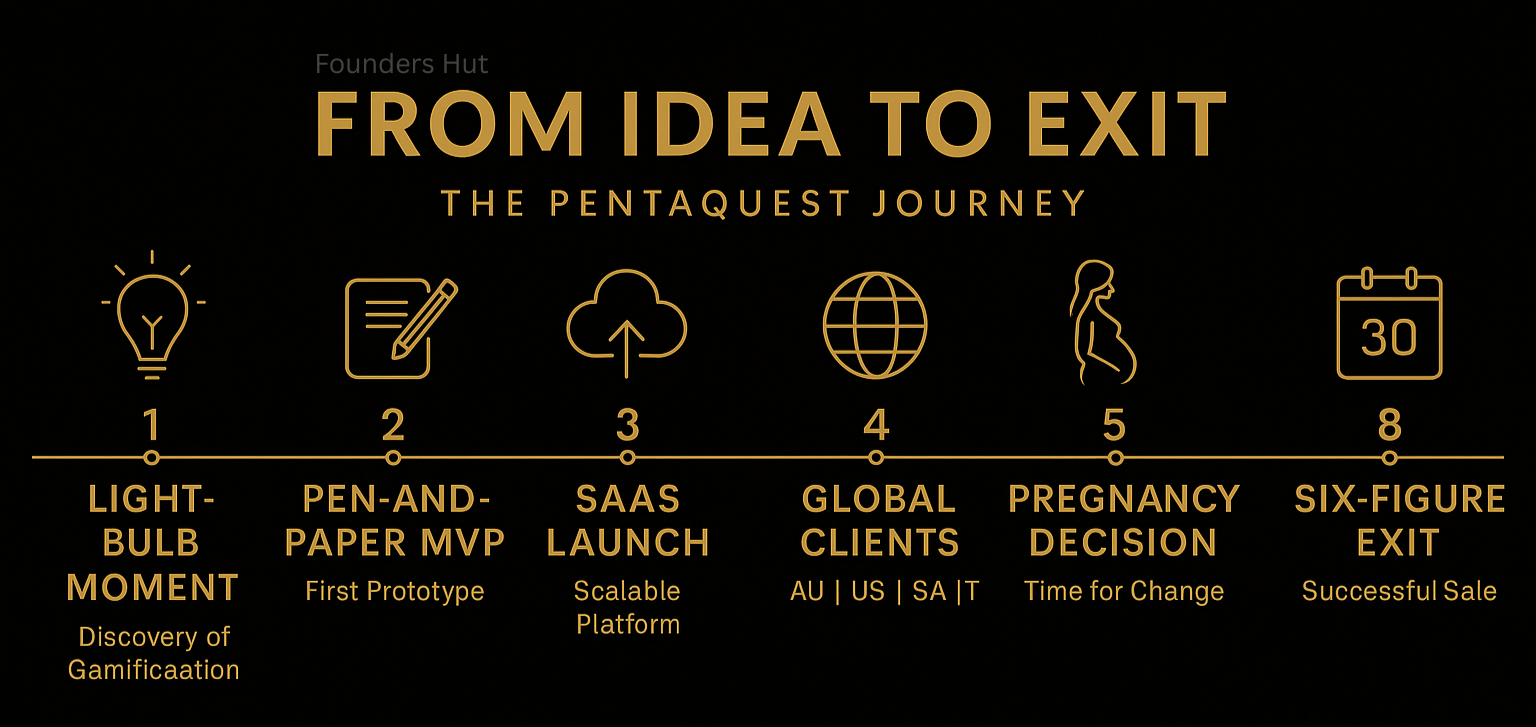How Dr. Kerstin Oberprieler Gamified a Six-Figure SaaS Exit


Business Description
Table of Contents
Navigate through the case study sections
Executive Summary
Case Study Content
Introduction
PentaQuest began when Dr. Kerstin Oberprieler noticed that most reward systems focus only on numbers: sales, targets, productivity. She believed that recognizing everyday actions, helping a colleague, sharing a learning resource, applauding good ideas, could reshape company culture. That spark led her to test a low-tech leaderboard at a local office.

Origin of the Idea
Growing up in a multicultural home made Kerstin fascinated by what drives behavior. She studied psychology and business, then discovered gamification. Instead of diving straight into software, she built a physical board with points for positive actions. It was a hit: teams wanted in, managers saw real engagement shifts.
Validating the Concept
Rather than risk heavy development costs, Kerstin ran pilot sessions with sticky notes and magnets. Workers saw a live tally of peer recognition and asked for their own versions. This quick proof of concept gave confidence to invest in a digital product.
Building the Platform
With feedback in hand, Kerstin tackled software development, even with zero coding background. She learned user experience basics, cloud hosting, and found developers to help. The first release let managers define behaviors, assign points, and track team progress on dashboards.
Scaling and Growth
To find customers, Kerstin leaned on her personal brand. She gave a TEDx talk in Canberra and joined the local innovation network. Winning a government contract provided credibility and steady revenue. She spoke at events, wrote articles, and forged partnerships. Word spread fast in HR circles.
Overcoming Obstacles
Cash flow was tight early on, so every expense was under a microscope. Explaining gamification took patience, some saw it as a gimmick. Technical bugs popped up as the user base grew. As a female founder in tech, Kerstin sometimes faced bias, but she let results speak.
Decision to Sell
After six years, a new chapter began. With a baby on the way, Kerstin listed PentaQuest on Flippa. More than 30 buyers surfaced within days. She weighed offers not just on price, but on the buyer’s vision for the product’s future. A six-figure deal closed two weeks before her due date.
Life After PentaQuest
Kerstin shifted into consulting, helping teams use behavior design without full in-house tools. She’s writing a book on culture change and gamification, sharing real-world lessons alongside theory.
Conclusion
PentaQuest shows that even a fresh idea tested on a wall can become a digital business that sells for six figures. It proves that understanding people, validating quickly, and building credibility are key to SaaS success.
Key Takeaways
- 1Validate your concept with a simple prototype to save time and money before full development.
- 2Leverage personal branding and speaking engagements to build credibility and attract early customers.
- 3Secure strategic contracts, like government deals, to drive steady revenue and enhance reputation.
- 4Focus on behaviors that shape culture, not just productivity metrics, to foster genuine engagement.
- 5Be prepared to manage tight cash flow by scrutinizing every expense and prioritizing growth activities.
- 6Plan your exit around life goals and choose buyers who share your vision for the product’s future.
Tools & Technologies Used
Premium Content Locked
Subscribe to access the tools and technologies used in this case study.
Unlock NowHow to Replicate This Success
Premium Content Locked
Subscribe to access the step-by-step replication guide for this case study.
Unlock NowInterested in Being Featured?
Share your success story with our community of entrepreneurs.
Explore More Case Studies
Discover other inspiring business success stories

How Media Scaling Drives 1 Billion Organic Views in Just Six Months
Media Scaling, founded by Logan Forsyth and Spencer Murphy, cracked a repeatable formula that drives one billion organic...
Media Scaling

How Jon Elder Left Construction, Built 5 Amazon Brands & Cashed Out for Millions in 5 Years
Jon Elder, disillusioned by the slow pace of corporate salary growth, started selling on Amazon in 2014. By focusing on ...
Black Label Advisor (Previously 5 Amazon Brands)

How Kitten Co. Jewelry Turned $2K into $350K Annual Revenue
Kitten Co. Jewelry started as Maya Portorreal’s side hustle to create hypoallergenic jewelry for sensitive skin. Using a...
Kitten Co. Jewelry
